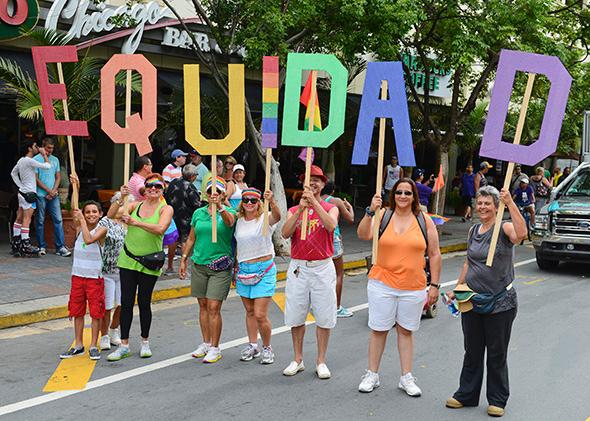The Supreme Court may well issue a ruling this June holding that the Constitution requires same-sex marriage in all 50 states. Such a ruling, court-watchers predict, will settle the question of marriage equality in America once and for all. But what about those 4 million Americans who don’t live in those states, but in one of five U.S. territories? For these people, a Supreme Court ruling will likely be the start, not the end, of a legal battle for marriage equality, a battle whose roots reach back to America’s imperialist past.
As of 2015, the United States controls five inhabited unincorporated territories: Puerto Rico, Guam, the U.S. Virgin Islands, American Samoa, and the Northern Mariana Islands. Anyone born in these territories automatically becomes a U.S. citizen—except in American Samoa, where, controversially, residents become only U.S. nationals. America acquired these territories as part of its colonialist expansion in the late 19th and early 20th centuries. And in a series of infamously racist decisions—the most important of which was penned by the author of Plessy v. Ferguson—the Supreme Court held that the Constitution only partially applies to the territories not clearly destined for statehood. The reason? The “alien races” in those territories simply “diff[er] from us” too much. (“Us,” of course, means white people.)
Today, these unfortunate decisions technically remain on the books—which is why, as John Oliver recently explained, U.S. territories are still deprived of full representation and equal voting rights. The Supreme Court, however, began eroding the logic of these opinions soon after they were announced. Initially, the court articulated several “fundamental rights,” like due process and equal protection, which apply in the territories. But starting in the 1950s, several justices began questioning the fundamental rights test, instead favoring a more expansive view of the constitutional liberties granted to the territories.
Juggling these muddled doctrines, the justices issued a century’s worth of decisions that are, even by the Supreme Court’s standards, freewheeling and fickle. By the 1970s, the court seemed to have decided that Puerto Rico was assimilated enough to deserve something approximating full constitutional protection. But its squishy language left room for lower courts to sign off on blatant violations in the other four territories. In 1980, a court approved the validity of an American Samoan law that forbade the sale of property to non-indigenous people—in total violation of equal protection. Ten years later, a federal court allowed the Northern Mariana Islands to continue to deny many criminal defendants a right to trial by jury—one of the most basic due process violations imaginable. These ostensibly fundamental rights, the courts decided, weren’t really fundamental in the territories.
In 2008, Boumediene v. Bush changed the landscape. Boumediene, a landmark case about the rights of Guantanamo prisoners, castigated the notion that any government has “the power to switch the Constitution on or off at will.” Writing for the court, Justice Anthony Kennedy declined to mechanically run through the fundamental rights rubric. Instead, he asked whether granting and enforcing a certain constitutional right outside the 50 states would be “impracticable and anomalous.” If so, the right could be foregone; if not, the right must be shielded. Kennedy’s test, while hazy, would seem to broaden the number of rights granted in the territories—from a handful of key clauses to all but a few guarantees.
Yet Boumediene did not purport to actually overrule the fundamental rights test, leaving the law of territorial constitutionality about as hazy as it has always been. No matter how emphatically the court rules in favor of marriage equality, then, at least a few of the territories may initially resist. A gay couple will have to bring a lawsuit in federal court to assert their rights. And the territorial government will probably argue, per Boumediene, that same-sex marriage is “anomalous” on their island.
Because same-sex marriage is surely no more anomalous in Samoa than it is in Alabama, these governments will likely lose. But the fact that they’ll even have a colorable claim is disheartening. If the Supreme Court isn’t too bored of (or traumatized by) marriage equality, it should take this opportunity to clarify the law here once and for all. The residents of the territories are just as American as anybody else who lives in the United States. And there’s no sense in denying them the full gamut of constitutional protections on account of some arcane, artificial distinction rooted in racism and ignorance.
Thanks to Christina Ponsa of Columbia Law School and Marybeth Herald of the Thomas Jefferson School of Law for their insights and aid.
